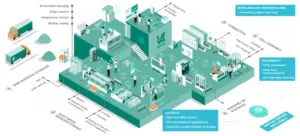July 31, 2023
Uncategorized

At Verkor, our watchwords are continuous innovation.
Our R&D teams constantly charter new ideas and invent new solutions for making ever more advanced batteries and improving manufacturing processes. This resulting technological breakthroughs therefore must be protected by intellectual property.
“Driving our innovation strategy is our determination to constantly review our approach, explore new ideas, and seek out inspired solutions to address the needs of our clients and the market. We are future-focused, and we are ready to rise to the mobility challenges of tomorrow.” – Christophe Mille, Chief Technology Officer of Verkor.
What is Industry 5.0?
Industry 5.0 is the data-enabled interface between human creativity and expertise, and the productivity and execution speed of machines and robotics. On the human side of the equation, Verkor’s first Gigafactory will draw on the technical expertise of 1,200 people to manufacture its batteries of tomorrow.

Model of Industry 5.0 at Verkor
On the machine side, our first Gigafactory will make its mark as the most modern and efficient in the world thanks to its data architecture and unprecedented degree of industrial digitalisation. We design these solutions in-house — solutions that are currently being tested at the Verkor Innovation Centre (VIC) and R&D Lab before being fully rolled out at the Dunkirk Gigafactory.
Innovation at Verkor is underpinned by a proactive policy on intellectual property. This means respecting third-party patents, and filing patent applications expeditiously to protect our inventions. In our three years of existence, Verkor has already filed over 20 patents.
Our focus is on optimising processes and improving cells so that we can produce top-performance and reliable batteries of the best possible quality. This is in line with our strategy to manufacture, now, the batteries tomorrow — ultra high-performance batteries using state-of-the-art chemistry, to equip electric vehicles from 2025 and meet growing demand in Europe.
Verkor develops technology bricks in new chemistry, as well as other cell formats to stay ahead of client requests. These building blocks help to improve battery performance: safety, energy density, fast recharge, power, self-discharge rate, lifespan, etc.
In order to keep optimising and increasing production output, Verkor innovates its manufacturing processes.
The safety of our product end-users is tantamount, and we therefore innovate our production processes and inspection methods to ensure cell reliability and quality.
For example, our teams have developed a technique for detecting defects using thermal imagery, sophisticated software, as well as artificial intelligence for detecting anomalies as early as possible in the cell manufacturing process.
We use digital innovation to reduce scrap thanks to better data management. We collect all the available data on the machines through sensors or by testing material from suppliers so that we can perform real-time analyses and implement the appropriate corrective actions as quickly as possible.
Verkor uses a digital twin (virtual simulation of a physical object) created by our teams to model the manufacture of its battery cells. With this technique we can predict any errors and tweak products before going into live production.
Digital innovation also means automating certain tasks so that we can turn our attention to promptly addressing process and productivity gaps.
–
By placing innovation at the heart of our strategy, Verkor has aligned its model to an overall approach: from technical development (product, process, digital) to talent attractiveness, construction, communication, and training with the creation of the Ecole de la Batterie: the first battery school in France.
Together, let’s innovate the mobility of tomorrow.